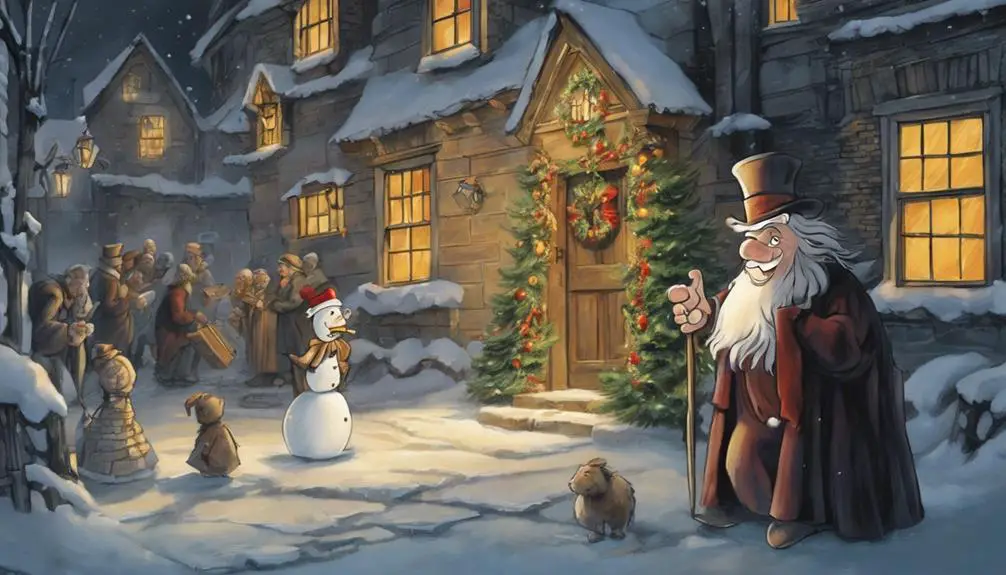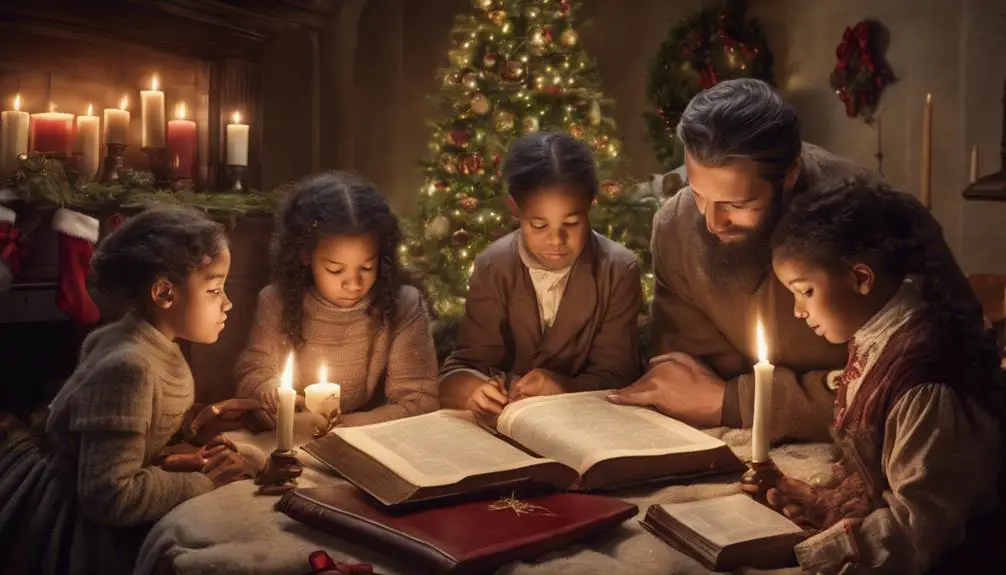Gain a deeper understanding of 'A Christmas Carol' as we unravel the biblical themes Dickens subtly weaves into this beloved holiday classic.

A Christmas Carol Bible Study
Just as a seasoned painter blends colors on a canvas, Charles Dickens masterfully intertwines biblical themes within his classic tale, 'A Christmas Carol'.
Have you ever considered how Scrooge's story of redemption mirrors the Gospel message? Or how Dickens' portrayal of love and charity echoes Christ's teachings?
The depth of this novel goes beyond the holiday cheer, it invites us to explore profound Christian themes.
But why does Dickens do this and what can we learn from it? Let's find out together.
Key Takeaways
- 'A Christmas Carol' reiterates biblical themes of repentance, redemption, and transformation reflected in Scrooge's journey.
- The Ghosts serve as divine messengers, embodying aspects of God's revelation and guidance.
- Scrooge's transformation and newfound generosity represent the gospel teachings of love, charity, and neighborly care.
- The narrative aligns with Christian teachings on salvation, judgment, and spiritual renewal, mirroring stories from the Bible.
A Christmas Carol': A Brief Overview

Charles Dickens' 'A Christmas Carol' is a timeless piece that, beyond its festive appeal, offers deep theological insights worth exploring. This classic novella, first published in 1843, tells the tale of Ebenezer Scrooge, a wealthy but miserly businessman devoid of empathy and kindness. On Christmas Eve, he's visited by the ghost of his deceased business partner, Jacob Marley, who warns him of the consequences of his life's selfish actions.
You're then taken on a journey with Scrooge as he encounters three spirits: the Ghost of Christmas Past, the Ghost of Christmas Present, and the Ghost of Christmas Yet to Come. These apparitions serve as catalysts for Scrooge's profound transformation, ultimately leading him to embody the true spirit of Christmas: generosity, compassion, and love.
In essence, 'A Christmas Carol' is a spiritual journey of redemption and transformation, marked by Dickens's intricate portrayal of the human condition and societal values. It's clear that Dickens created not just a story of holiday cheer, but a narrative rich with profound theological implications. In the following sections, we'll dive deeper into these spiritual nuances that make 'A Christmas Carol' a perfect subject for theological analysis.
Biblical Themes in 'A Christmas Carol

Delving into 'A Christmas Carol,' one can uncover a plethora of Biblical themes intricately woven into the narrative, illuminating the profound spiritual depth of Dickens' work. A salient theme you'll notice is the concept of poverty and wealth. Dickens mirrors the Biblical teachings of Jesus who championed for the poor and criticized the wealthy. Remember the story of Lazarus and the rich man in Luke 16:19-31? You'll see the same dynamics play out in the lives of Scrooge and Bob Cratchit.
Furthermore, you're invited to explore the theme of prophecy. The three spirits who visit Scrooge are reminiscent of the Old Testament prophets, bringing with them visions and warnings. Their purpose is strikingly similar – to stir repentance and change.
Lastly, consider the theme of judgment and the afterlife. Marley's ghost, in his chains and despair, embodies a clear reference to hell and judgment. Dickens, much like the Bible, uses this imagery to illustrate the consequences of a life lived in greed and self-interest.
Redemption in Scrooge's Transformation

In the heart of 'A Christmas Carol,' you witness a profound transformation in Scrooge, a redemption arc that echoes the Biblical promise of salvation for those who repent and change their ways. This shift in Scrooge's character isn't a mere change of heart; it's a theological metamorphosis that mirrors the process of sanctification in Christian theology.
Scrooge's redemption starts with his acknowledgement of past wrongs, a crucial first step towards repentance, mirroring the Biblical concept of confession. The Ghost of Christmas Past acts as a catalyst, bringing Scrooge face to face with his sinful nature. This encounter stirs in him a sense of remorse, paving the way for transformation.
From remorse, Scrooge progresses to repentance, the act of turning away from sin, symbolized by his changed behavior in the presence of the Ghost of Christmas Present. His new-found compassion towards the Cratchits is a clear sign of his repentance.
Love and Charity: Echoes of Gospel Teaching

As you delve deeper into the narrative, you'll find that Scrooge's transformation also embodies the gospel teachings of love and charity. Dickens masterfully weaves these Christian principles into the heart of his tale, demonstrating their profound impact on a hardened soul.
In the beginning, Scrooge is portrayed as a symbol of selfishness and greed, far removed from gospel virtues. However, as he encounters the ghosts of Christmas past, present, and future, he experiences a spiritual awakening. This isn't just about fear of eternal damnation, but a realization of the joy and fulfilment that comes from love and charity.
His newfound generosity towards the Cratchit family and his nephew Fred aren't random acts of kindness. They're an expression of his understanding of the gospel's call to love our neighbors as ourselves. His actions mirror the biblical teaching in 1 Corinthians 13:3, 'If I give all I possess to the poor… but don't have love, I gain nothing.'
Scrooge's transformation is a powerful illustration of these gospel teachings, reminding us that a life lived in love and charity isn't only commendable but also transformative. This aspect of Dickens' classic tale provides a rich vein for theological exploration.
A Christmas Carol' and the Christian Message

Exploring further, you'll find that 'A Christmas Carol' is not just a festive tale but also a profound dissemination of the Christian message. Its themes of repentance, redemption, and transformation echo the teachings of Christianity. Scrooge's journey from a cold-hearted miser to a compassionate benefactor mirrors the Christian belief in the possibility of spiritual rebirth and forgiveness.
Theme |
Christian Correspondence |
|---|---|
Repentance |
A change of heart and turning away from sin |
Redemption |
Salvation through Christ's sacrifice |
Transformation |
The process of sanctification |
The Ghosts of Christmas Past, Present, and Future can be seen as divine messengers, guiding Scrooge to enlightenment. Their roles resonate with the Christian concept of God's revelation and guidance. The Ghost of Christmas Present, with its abundance and joy, embodies the message of God's generosity and blessings. The Ghost of Christmas Future, with its grim visage, reminds us of the judgment that awaits if we do not heed God's call.
Conclusion
In conclusion, 'A Christmas Carol' brilliantly mirrors biblical themes of redemption, love, and charity. Scrooge's transformation echoes the transformative power of Christ's love.
The story's emphasis on charity mirrors Gospel teachings, underlining the Christian message of love thy neighbor.
Ultimately, Dickens' work serves as a profound Bible study – a reminder of the profound impact of redemption and love in the world.



Sign up